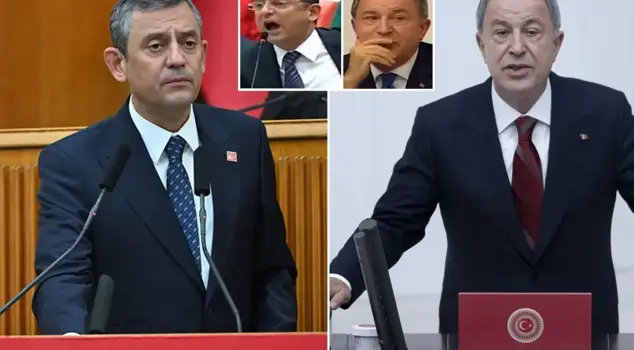
02.02.2025 15:23
The 4th Civil Chamber of the Court of Cassation unanimously upheld the decision of the Regional Court of Appeals, which rejected the compensation lawsuit filed by former Minister of National Defense Hulusi Akar against CHP Chairman Özgür Özel for his statements, "Your comrades-in-arms died without forgiving you" and "disgraceful." The reasoning emphasized that the expressions constituted harsh and severe criticism and did not constitute an attack on personal rights.
CHP Chairman Özgür Özel stated that during the budget discussions in the Turkish Grand National Assembly while he was the group deputy chairman, he expressed his grievances towards the then Minister of National Defense Hulusi Akar, saying, "He never visited us even once while our comrades were in prison." He added, "Your comrades died without forgiving you. You are a man who has received the curse of your comrades." In another speech, Özel said, "As CHP, we respect positions, but I wish you hadn't served as Chief of General Staff. It shouldn't have been such a Chief of General Staff."
HE HAD DEMANDED 500 THOUSAND TL IN MORAL COMPENSATION
Minister Akar had demanded 500 thousand TL in moral compensation, claiming that Özel's statements towards him were of "insult and slander" nature. On December 2, 2020, the Ankara 28th Civil Court of First Instance ruled in favor of Akar, ordering Özel to pay 15 thousand TL in compensation.
THE DECISION WAS UNANIMOUSLY APPROVED
Upon Özgür Özel's application, the Ankara Regional Court of Appeal decided to annul the first-instance court's decision and reject the case, stating that the conditions for compensation were not met. Hulusi Akar appealed the Regional Court of Appeal's annulment decision. The Supreme Court's 4th Civil Chamber, which reviewed the case upon appeal, unanimously upheld the Regional Court of Appeal's decision.
In the reasoning for the Supreme Court's 4th Civil Chamber's approval, examples from the Constitutional Court (AYM) and the European Court of Human Rights (ECHR) decisions were cited, stating: "The term 'disgraceful' used by the defendant in response to some statements of the plaintiff is not directed at the plaintiff personally, but is a value judgment and harsh criticism regarding the way he performed his previous duty. It is noted that the defendant made personal evaluations on behalf of his party regarding a current issue, and that the plaintiff, who serves as a politician after holding a public office, should endure more criticism due to his current position; similarly, when evaluating the words and statements made by the defendant during the budget discussions of the Ministry of National Defense (MSB), it should be considered as a harsh and severe criticism regarding the way the plaintiff performed his previous duty, within the framework of legislative immunity guaranteed by the Constitution of the Republic of Turkey, and it is understood that the plaintiff responded to these words from the podium on the same day."
The reasoning emphasized that, as adopted in many decisions of the AYM, freedom of expression, which constitutes one of the essential conditions for the progress of society and the self-confidence of the individual, is valid not only for accepted or harmless or neutral information or ideas but also for those that are offensive, shocking, or disturbing.
"DOES NOT CONSTITUTE AN ATTACK ON THE PLAINTIFF'S PERSONAL RIGHTS"
The reasoning stated that the AYM has acknowledged in many of its decisions that freedom of expression should be interpreted broadly to allow for a degree of exaggeration and even provocation, and made the following determinations: "Although the defendant used some coarse, offensive, and provocative words and expressions, it should be accepted that these expressions, which consist of value judgments, are part of a political style aimed at provoking debate, creating strong reactions, and consolidating supporters, and that politicians should endure these harsh criticisms due to their position. In light of all these explanations, it is understood that the words and expressions used by the defendant do not constitute an attack on the plaintiff's personal rights, but are of a nature of harsh and severe criticism, and that the defendant's freedom of expression should be prioritized, and it is understood that there is no need for a limitation on freedom of expression that could be considered legitimate by a democratic society, thus the decision examined on appeal is in accordance with procedure and law, and the reasons put forward by the plaintiff's attorney in the appeal petition are not of a nature that would require the decision to be overturned."